
# 243
December 10, 2004
In this issue:
UNITED NATIONS DEVELOPMENT PROGRAMME (UNDP) /UN VOLUNTEERS
- Moving Things Forward: The International Volunteer Day celebrations in Kyrgyzstan-2004
UNITED NATIONS CHILDREN€™S FUND (UNICEF)
- For the first time in the region, Kyrgyzstan has put child poverty at the centre of its national poverty debate
UNITED NATIONS DEVELOPMENT PROGRAMME (UNDP) /UN VOLUNTEERS
Moving Things Forward: The International Volunteer Day celebrations in Kyrgyzstan-2004
 The International Volunteer Day was proclaimed by the United Nations General Assembly in 1985. Since then the UN Volunteers Program and its civil society partners have joined volunteers around the world to celebrate that volunteer service is making an important contribution to realization of the MDGs. The International Volunteer Day was proclaimed by the United Nations General Assembly in 1985. Since then the UN Volunteers Program and its civil society partners have joined volunteers around the world to celebrate that volunteer service is making an important contribution to realization of the MDGs.
The UNV Program in Kyrgyzstan has been supporting human development by promoting volunteerism and by mobilizing volunteers with its initiatives in the country since 1996. http://www.unv.org.kg
The UNV Volunteer Information Center has been playing a role as the leading advocate of volunteerism in development and Millennium Development Goals in Kyrgyzstan, especially among young population since 2000. http://www.unv.org.kg/rc
Volunteer actions in the country side of Kyrgyzstan to celebrate IVD-2004
40 National UNVs together with local volunteers, students, teachers, local civil servants, community leaders and other engaged citizens conducted a number of volunteer activities before, and after the 5/12. This year the focus was on supporting and improve living conditions for marginalized people. The below mentioned activities are all supported through the POEM-funds of the UNV office in Kyrgyzstan.
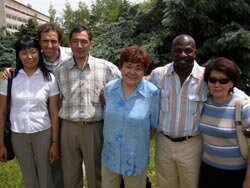 Talas Province: Talas Province:
10 families received support from local volunteers of Youth Centre €œZaman Ordo€, the UNESCO Public Media Centre and UNVs in renovation of their houses, garden-work and other heavy labour requested by these families.
Advocacy seminar on gender issues from a perspective of traditions and customs in a Muslim country focused on teachers and students of the Talas State University was arranged by UNVs in Talas.
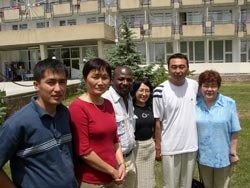 Issyk-Kul Province: Issyk-Kul Province:
UNVs provided support to the National Mental/Psychiatric Institution for Women in Issyk-Kul. The women (almost 180 women from 18 years and up) residing in this institution have lack of almost all basic necessities. The UNVs provided soap, washing powder and other detergents. There was also a day of entertainment and a modest party for these women as they are seldom exposed to this during their stay in this institution.
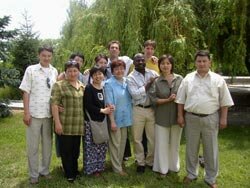 Batken Province Batken Province
UNVs together with local volunteers from the Karabak Village Municipality, consisting of six villages organized direct actions to help rural families. The poorest households in these villages received support in renovating their houses, especially in preparing for the winter to come. Windows were isolated and doors repaired. Houses were painted and gardens beautified. The local volunteers were school-teachers, students, local municipality staff and other activists.
Chui Province
UNVs together with local youth NGO members and volunteers from the Local Government Administration visited the Institution for Handicapped People in Tokmok City (60 km far from Bishkek). The volunteers undertook renovation of parts of the institution. This was followed by a small celebration of the IVD and discussions on volunteerism.
International Volunteer Day in the capital Bishkek
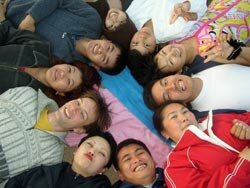 A number of advocacy meetings and seminars were conducted to promote UNV and Volunteerism. On 30 November a presentation was conducted by Magnus Bjork, UNV Programme Officer on UNV and Private/Corporate Sector Volunteer Program at the International Business Council Meeting in Hyatt Hotel, Bishkek. 70 participants from International Financial Institutions, Government, International Development Agencies, Civil Society and the Media participated at the event. A number of advocacy meetings and seminars were conducted to promote UNV and Volunteerism. On 30 November a presentation was conducted by Magnus Bjork, UNV Programme Officer on UNV and Private/Corporate Sector Volunteer Program at the International Business Council Meeting in Hyatt Hotel, Bishkek. 70 participants from International Financial Institutions, Government, International Development Agencies, Civil Society and the Media participated at the event.
1 December a lecture and discussions with 100 students on UNV, Volunteerism and HIV/AIDS by UNV Team in Bishkek took place at the Bishkek Arabaev University.
1 December a presentation and discussions with 65 new Peace Corps (PC) Volunteers and PC Staff on UNV took place in Issyk-Kul Hotel, Bishkek
3 December UNV Seminar with participation of all UNVs in Kyrgyzstan-total 44 was conducted. The seminar included media-training, international career advice, briefing on the use of onlinevolunteers, UNV Youth Project in Kyrgyzstan and the work of UNHCR and UNFPA in Kyrgyzstan.
3 December a Joint Press Conference with JICA, Peace Corps and UNV was conducted in the UN House, Bishkek. All United Nations Volunteers, as well as 2 JICA volunteers and 2 Peace Corp. volunteers including representatives from the management met with Kyrgyz journalists on the eve on the International Volunteer Day.
Each agency presented its work and joint initiatives. The media were then given 30 minutes to informally talk/interview representatives from the various Volunteer Agencies. Joint UN Volunteers, JICA and Peace Corps in Kyrgyzstan press-release stressed, that UNV, JICA and Peace Corps are the biggest international volunteer organizations in Kyrgyzstan. Together the organizations have currently 181 Volunteers in Kyrgyzstan (44 UN Volunteers, 120 Peace Corps Volunteers and 17 JICA/JOCV Volunteers). A majority of these volunteers are placed in the field to provide support to the Kyrgyz people. The majority of these volunteers are American, Japanese and Kyrgyz citizens. There are also volunteers from Italy, Sweden and Germany.
In the field, Peace Corps Volunteers and UN Volunteers help and support each other in various ways. Support with local knowledge and contacts as well as English language training are provided as mutual support. Peace Corps and UN Volunteers are planning to work even more closely in the future. Areas of interest are business development, support to youth groups and English language skills. JICA has been working together with UNV on the planning for a community based development project in Issyk-Kul Province where UNV provided technical assistance and the National UNVs in the province provided support throughout the planning of this project.
The International Volunteer Day will be celebrated in Kyrgyzstan through a variety of local initiatives in connection with this day of volunteerism, arranged by UNV. Peace Corps will celebrate this by arranging the traditional swearing-in-ceremony for the new Peace Corps Volunteers that will take place in Bishkek on 3/12.
UN Volunteers has currently four International UNV (IUNV) Specialists and 40 National UNV Specialists (NUNVs) serving in Kyrgyzstan. Most of them are working with UNDP Local Self-Governance Program and UNDP Poverty Reduction Program. Other thematic areas are Program Development, PR and the Promotion of Youth Volunteerism. Three NUNVs are serving with UNHCR and one IUNV with UNFPA.
Peace Corps was established in 1993 in Kyrgyzstan. As of December 2004 there are 120 Peace Corps Volunteers serving in villages, towns, and cities across the country. These Volunteers are teaching English at schools and universities and are involved in organizational development activities with NGOs and government organizations. Support is also provided to business development.
Japan International Cooperation Agency (JICA) dispatches Japan Overseas Cooperation Volunteers (JOCV) and Senior Volunteers (SV) to Kyrgyzstan. There are currently 17 volunteers working in Kyrgyzstan. They are engaged as Physical Education Teachers, Music Teachers, Japanese Language Instructors and other areas. Two Senior Volunteers are working in the field of Japanese Massage and Fashion Design.
UN Volunteer Information Centre celebrates the International Volunteer Day with Exibitions
06 December 2004 - United Nations Volunteers Volunteer Information Center (UNV-VIC) celebrated the International Volunteer Day with local school pupils and university students during the IVD Week €“ 29 November ~ 02 December. This year UNV-VIC organized a volunteer activity exhibition that introduced various volunteer activities in Kyrgyzstan implemented by the local young volunteers as well as international volunteers.
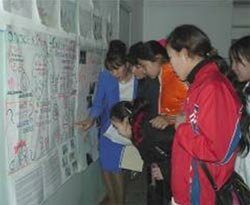 The celebration began at the Apassa Jumagulova school in Kok-Jar Village located next to the capital Bishkek on 29 November. The exhibition was coordinated by the local Non Governmental Organization (NGO) Kok-Jar€™s and Youth Committee. They have been working with the local school to support children by organizing various events such as anti smoking campaign, concerts, study-sessions on gender, healthy life and child rights. Ms. Bermet Keneshova, Coordinator of NGO Kok-Jar€™s, said €œWe have several very active volunteers including a 4th grade girl in our organization. I believe that today€™s event has given our children incentives to get more involved in volunteer work.€ The celebration began at the Apassa Jumagulova school in Kok-Jar Village located next to the capital Bishkek on 29 November. The exhibition was coordinated by the local Non Governmental Organization (NGO) Kok-Jar€™s and Youth Committee. They have been working with the local school to support children by organizing various events such as anti smoking campaign, concerts, study-sessions on gender, healthy life and child rights. Ms. Bermet Keneshova, Coordinator of NGO Kok-Jar€™s, said €œWe have several very active volunteers including a 4th grade girl in our organization. I believe that today€™s event has given our children incentives to get more involved in volunteer work.€
The Volunteer Activity Exhibition was also held at International University of Kyrgyzstan, Kyrgyz State Pedagogical University, Kyrgyz State University of Transportation and Architecture and American University of Central Asia coordinated by student or teacher volunteers. Approximately 500 students in total visited the exhibition and learned about youth volunteer activities by reading articles and looking at photos as well as chatting with international and local volunteers. Many of them looked inspired by volunteer activities run by their peer fellows.
One student said, €œI was also very much interested in volunteering, but did not know what I could do. Now I know I want to organize an English Club at my university. Students always talk about lack of opportunities to practice English. I can volunteer to make such opportunities for ourselves.€
IVD 2004 through the prism of mass media in Kyrgyzstan: Kyrgyzstan Marks International Volunteer Day
BISHKEK (The Times of Central Asia, published 9th December). On December 3 International Volunteer Day was marked at the UN House in Bishkek. The Bishkek offices of the UN, the US Peace Corps, and the Japanese International Cooperation Agency (JICA) organized a conference for their volunteers working throughout Kyrgyzstan and international program officers.
Today 181 volunteers work in Kyrgyzstan including 44 UN volunteers, 120 Peace Corps volunteers, and 17 JICA volunteers.
UN volunteers implement UNDP programs to reduce poverty and improve local self-government in Kyrgyzstan. Three volunteers work with the UNHCR. The Peace Corps volunteers teach English to Kyrgyz schools and university students and assist to develop local NGOs and businesses. The volunteers o JICA teach phisical education, music, and the Japanese language, and one volunteer works in a rather exotic sphere €“ Japanese massage. Foreign volunteers in Kyrgyzstan are paid for travel and receive money for petty expences, but they are not paid a salary. This however, does not prevent the citizens of the United States, Japan, Italy, and other countries from working as volunteers here.
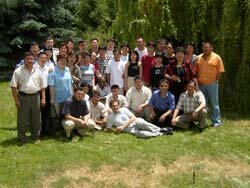 Elba, a volunteer from Puerto Rico, has worked in Kyrgyzstan with her husband for one year. €œA volunteer€™s work has nothing in common with, for instance, the service of foreign military at the local air base. We just work in this country and help people,€ she said. A political analyst by education, Elba thinks that her work in Central Asia is a good experience that she can use in the future. Elba, a volunteer from Puerto Rico, has worked in Kyrgyzstan with her husband for one year. €œA volunteer€™s work has nothing in common with, for instance, the service of foreign military at the local air base. We just work in this country and help people,€ she said. A political analyst by education, Elba thinks that her work in Central Asia is a good experience that she can use in the future.
€œThe main reason why we have come to Kyrgyzstan is the possibility to help people and learn a new culture and language. We regard volunteer€™s work as part of our life,€ international volunteers say.
There are also local volunteers here in Kyrgyzstan such as Talgat. Before 2001 he had worked for an international corporation and travelled all over Kyrgyzstan. €œI saw the poor life in villages where people had no job. In 2001, I joined the UN volunteer mission,€ he said. Currently Talgat works with the project to improve the local self-government system. €œWe assist people in developing local communities and work, in cooperation with the government structures, on power decentralization and development of local government institutions,€ he said.
The conference presented a new two-year project for UN Volunteers that will be implemented through a US $ 396,000 grant by the Government of Japan and US $ 50,000 from the UNDP office in Kyrgyzstan. In the first large-scale project targeted at young people in Kyrgyzstan. International volunteers will involve local youth in volunteering for development their communities.
Some are sceptical about the prospects of the project. €œMost young people in Kyrgyzstan are socially passive and apolitical. It is rather problematic for young people that a volunteer€™s work is not paid,€ said Talgat.
By Leonid Tuzov, TCA contributor
UNITED NATIONS CHILDREN€™S FUND (UNICEF)
For the first time in the region, Kyrgyzstan has put child poverty at the centre of its national poverty debate
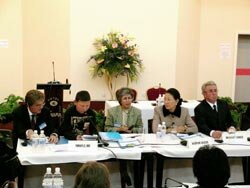 A 2-day national Conference "Child Poverty: Effective Strategies towards its Elimination in Kyrgyzstan" was held on 6-7 December by the Government with support of UNICEF, UNDP, DFID and Meerim Foundation. A 2-day national Conference "Child Poverty: Effective Strategies towards its Elimination in Kyrgyzstan" was held on 6-7 December by the Government with support of UNICEF, UNDP, DFID and Meerim Foundation.
The conference was attended by some of the most senior government officials including the Prime Minister, the Vice Prime Minister, several key Ministers (Finance, Health, Education, Social Protection) as well as representatives of the key donors, international and non-governmental organizations. The First Lady actively participated in all the session of the Conference. Some children and young people from the Kelechek community, an urban settlement of internal migrants, had prepared for and participated in the Conference. These children work in the informal sector in the nearby Bazaar. Many have dropped out of school but some have gone back or take night classes. Their life stories and experiences of poverty were assembled in a brochure distributed at the Conference. A powerful message from one of the boys named Maksat was "To solve all these problems is impossible, but I am asking to solve some of them". The Prime Minister, in his closing remark, told that the Government would be looking into the problems (need for a school, employment for parents, school transport, stopping of informal payments for education, water an electricity for the settlement, etc) raised by these children.
Besides, DFID and UNDP, the IMF, the WB and USAID spoke positively about the importance of elimination of child poverty and their work in the area of poverty reduction. IMF was supportive of efforts for elimination of child poverty and encouraged the government to prepare quality social investment programmes for funding under the proceeds of some of its assets.
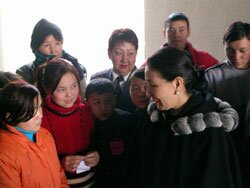 There was recognition that poverty reduction is wider than the three social sectors of health, education and social protection and that other actors including communication, environment and justice also needed to join the strategy. Decentralization and capacity building at local level emerged as priority focus, cutting across other areas, and the way administrative reform interact with this process. It was recognized that there could be a mismatch between the NPRS programme and the allocated budget. One area where more work is needed is for disaggregated budget analysis of social sectors especially, health, education, social protection/welfare and water and sanitation, so as to identify efficiency gains and redistribution of existing resources within each sector to the basic and primary service components of each, e.g. public health centres, early childhood development and primary education as opposed to tertiary services. There is also need for identifying and putting in place systematic mechanisms and processes for participation of children and young people. There was recognition that poverty reduction is wider than the three social sectors of health, education and social protection and that other actors including communication, environment and justice also needed to join the strategy. Decentralization and capacity building at local level emerged as priority focus, cutting across other areas, and the way administrative reform interact with this process. It was recognized that there could be a mismatch between the NPRS programme and the allocated budget. One area where more work is needed is for disaggregated budget analysis of social sectors especially, health, education, social protection/welfare and water and sanitation, so as to identify efficiency gains and redistribution of existing resources within each sector to the basic and primary service components of each, e.g. public health centres, early childhood development and primary education as opposed to tertiary services. There is also need for identifying and putting in place systematic mechanisms and processes for participation of children and young people.
At the end of the Conference the government agreed in principle to adoption of a resolution with agreed action points as a concrete follow-up to the meeting. The work on the resolution should be completed in the course of next 7-8 days. It would provide amongst other things for a comprehensive and multidimensional framework for addressing child poverty, establishment of a set of indicators for monitoring child poverty reduction, and development of creative and systematic processes for including the voice of children and young people in the planning, implementation and monitoring and assessment of child poverty programmes.
Shahnaz Kianian-Ferouzgar, UNICEF Deputy Regional Director pointed out €œThere are a number of factors which give reason for high optimism that the country can achieve elimination of child poverty by 2015 if not earlier. Amongst these are: steady economic growth accompanied by a declining GINI coefficient, which while necessary will not be sufficient for elimination of child poverty; decline of overall poverty by 3.6% per year since 2001; sound analysis of macroeconomic and resource situation backed up with much good data and research on the social side; government commitment to mainstream child poverty elimination in the new NPRS with clear strategies prioritized, cost and linked to budget; and a social protection benefit package targeting poor and marginalized families.€
For additional information, please contact: Galina Solodunova, UNICEF Communications Officer. Phone: (996 312) 611 211 (ext.139); 611 224...7, e-mail:
|

